Related Research Articles

Amygdalin is a naturally occurring chemical compound found in many plants, most notably in the seeds (kernels) of apricots, bitter almonds, apples, peaches, cherries, and plums.
A toxin is a harmful substance produced within living cells or organisms; synthetic toxicants created by artificial processes are thus excluded. The term was first used by organic chemist Ludwig Brieger (1849–1919), derived from the word toxic.

The Pure Food and Drug Act of 1906 was the first of a series of significant consumer protection laws which was enacted by Congress in the 20th century and led to the creation of the Food and Drug Administration. Its main purpose was to ban foreign and interstate traffic in adulterated or mislabeled food and drug products, and it directed the U.S. Bureau of Chemistry to inspect products and refer offenders to prosecutors. It required that active ingredients be placed on the label of a drug's packaging and that drugs could not fall below purity levels established by the United States Pharmacopeia or the National Formulary.
Bioaccumulation is the gradual accumulation of substances, such as pesticides or other chemicals, in an organism. Bioaccumulation occurs when an organism absorbs a substance at a rate faster than that at which the substance is lost or eliminated by catabolism and excretion. Thus, the longer the biological half-life of a toxic substance, the greater the risk of chronic poisoning, even if environmental levels of the toxin are not very high. Bioaccumulation, for example in fish, can be predicted by models. Hypotheses for molecular size cutoff criteria for use as bioaccumulation potential indicators are not supported by data. Biotransformation can strongly modify bioaccumulation of chemicals in an organism.
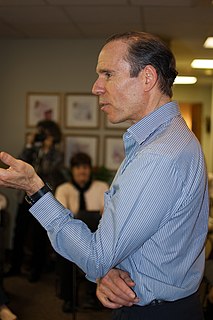
Joel Fuhrman is an American celebrity doctor who advocates what he calls a "micronutrient-rich diet". His practice is based on his nutrition-based approach to obesity and chronic disease, also referred to as a nutritarian or restrictive diet, as well as promoting his products and books. He has written several books promoting his dietary approaches including the bestsellers Eat to Live, Super Immunity,The Eat to Live Cookbook,The End of Dieting (2016). and The End of Heart Disease (2016). He sells a related line of nutrition related products.
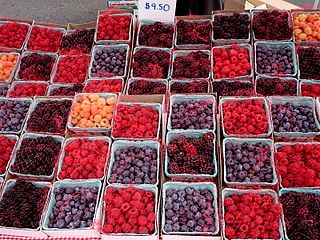
Phytochemicals are chemical compounds produced by plants, generally to help them resist fungi, bacteria and plant virus infections, and also consumption by insects and other animals. The name comes from Greek φυτόν (phyton) 'plant'. Some phytochemicals have been used as poisons and others as traditional medicine.

The fugu in Japanese, bogeo or bok (복) in Korean, and hétún in Standard Modern Chinese is a pufferfish, normally of the genus Takifugu, Lagocephalus, or Sphoeroides, or a porcupinefish of the genus Diodon, or a dish prepared from these fish.

Foodborne illness is any illness resulting from the spoilage of contaminated food by pathogenic bacteria, viruses, or parasites that contaminate food, as well as prions, and toxins such as aflatoxins in peanuts, poisonous mushrooms, and various species of beans that have not been boiled for at least 10 minutes.

A chocoholic is a person who craves or compulsively consumes chocolate. The word "chocoholic" was first used in 1968, according to Merriam-Webster. It is a portmanteau of "chocolate" and "alcoholic". The term is used loosely or humorously to describe a person who is inordinately fond of chocolate; however, there is medical evidence to support the existence of actual addiction to chocolate. Psychoactive constituents of chocolate that trigger a ‘feel-good’ reaction for the consumer include tryptophan and phenylethylamine, which may contribute to cravings and addiction-like responses, particularly in people with specific genetic alleles. The quantity of sugar used in chocolate confections also impacts the psychoactive effects of chocolate.

Ruth Reichl, is an American chef, food writer, co-producer of PBS's Gourmet's Diary of a Foodie, culinary editor for the Modern Library, host of PBS's Gourmet's Adventures With Ruth, and the last editor-in-chief of Gourmet magazine. She has written critically acclaimed, best-selling memoirs: Tender at the Bone: Growing Up at the Table, Comfort Me with Apples: More Adventures at the Table, Garlic and Sapphires: The Secret Life of a Critic in Disguise and Not Becoming My Mother. In 2009, she published Gourmet Today a 1,008 page cookbook containing over 1,000 recipes. She published her first novel, Delicious! in 2014, and, in 2015, published My Kitchen Year: 136 Recipes That Saved My Life, a memoir of recipes prepared in the year following the shuttering of Gourmet.
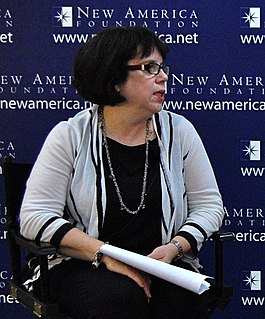
Deborah Blum is an American journalist and the director of the Knight Science Journalism program at the Massachusetts Institute of Technology. She is author of books including The Poisoner's Handbook (2010) and The Poison Squad (2018), and has been a columnist for The New York Times and a blogger for Wired.

Many species of fish are consumed as food in virtually all regions around the world. Fish has been an important source of protein and other nutrients for humans throughout history.

Ruth Sager was an American geneticist. Sager enjoyed two scientific careers. Her first was in the 1950s and 1960s when she pioneered the field of cytoplasmic genetics by discovering transmission of genetic traits through chloroplast DNA, the first known example of genetics not involving the cell nucleus. The academic community did not acknowledge the significance of her contribution until after the second wave of feminism in the 1970s. Her second career began in the early 1970s and was in cancer genetics; she proposed and investigated the roles of tumor suppressor genes.
Eula Bingham was an American scientist, best known as an Assistant Secretary of Labor for Occupational Safety and Health (OSHA) during the Presidency of Jimmy Carter. During her tenure as the head of OSHA, she eliminated more than 1,000 pedantic regulations and shifted the agency's focus to health and safety risks, establishing strict standards for workers' rights to know about their exposure to hazardous substances.
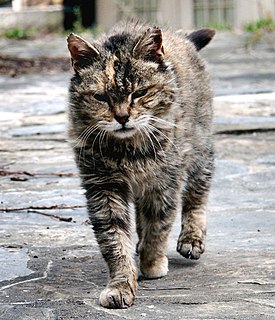
The health of domestic cats is a well studied area in veterinary medicine.
Jane Ellen Brody is an American author on science and nutrition topics, who has written a number of books and reported extensively for The New York Times as its "Personal Health" columnist, which appears weekly in the paper's Science Times section, which has been syndicated nationwide. She has been called the "High Priestess of Health" by Time magazine.
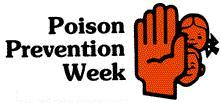
National Poison Prevention Week is observed in the United States the third week of March. The goal of the week is to raise awareness of the risk of being poisoned by household products, medicines, pesticides, plants, bites and stings, food poisoning, and fumes. Awareness being duly raised, it is hoped that this will prevent poisoning.

Ann Landers was a pen name created by Chicago Sun-Times advice columnist Ruth Crowley in 1943 and taken over by Esther Pauline "Eppie" Lederer in 1955. For 56 years, the Ask Ann Landers syndicated advice column was a regular feature in many newspapers across North America. Owing to this popularity, "Ann Landers", though fictional, became something of a national institution and cultural icon.

Michael Herschel Greger is an American physician, author, and professional speaker on public health issues, best known for his advocacy of a whole-food, plant-based diet, and his opposition to animal-derived food products.

William Frank Longgood was an American award-winning journalist and writer best known for the controversial book Poisons in Your Food.
References
- 1 2 3 4 5 6 7 8 Matthews, Tracey L. (2005). Contemporary Authors: New Revision Series. Vol. 139. Thomson/Gale. pp. 447–449
- 1 2 3 4 Taft, William H. (2016). Encyclopedia of Twentieth Century Journalists. Routledge. pp. 373–374. ISBN 978-1-138-92631-8
- ↑ "Dr. Arthur Winter, Renowned Brain Surgeon". Patch Media. Retrieved March 1, 2020.
- ↑ Kroger, Manfred. (1970). Reviewed Work: Poisons in Your Food by Ruth Winter. The Journal of Consumer Affairs 4 (1): 74–77.
- ↑ Cook, Joan. (1976). A Book by Any Other Name .... The New York Times . Retrieved March 1, 2020.
- ↑ "Scent Talk Among Animals". Kirkus Reviews . Retrieved March 1, 2020.